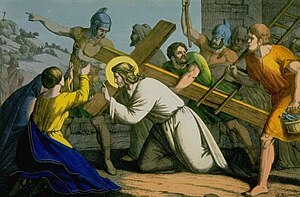
A hymnal or hymnary is a collection of hymns, usually in the form of a book, called a hymnbook. Hymnals are used in congregational singing. A hymnal may contain only hymn texts ; written melodies are extra, and more recently harmony parts have also been provided.

The epiclesis is the part of the Anaphora by which the priest invokes the Holy Spirit upon the Eucharistic bread and wine in some Christian churches.
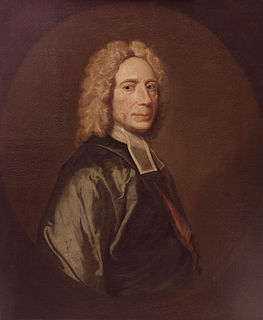
Isaac Watts was an English Christian minister (Congregational), hymn writer, theologian, and logician. He was a prolific and popular hymn writer and is credited with some 750 hymns. He is recognized as the "Godfather of English Hymnody"; many of his hymns remain in use today and have been translated into numerous languages.

Love Divine, All Loves Excelling is a Christian hymn by Charles Wesley with a theme of "Christian perfection." Judging by general repute, it is among Wesley's finest: "justly famous and beloved, better known than almost any other hymn of Charles Wesley." Judging by its distribution, it is also among his most successful: by the end of the 19th century, it is found in 15 of the 17 hymn books consulted by the authors of Lyric Studies. On a larger scale, it is found almost universally in general collections of the past century, including not only Methodist and Anglican hymn books and commercial and ecumenical collections, but also hymnals published by Reformed, Presbyterian, Baptist, Brethren, Seventh-day Adventist, Lutheran, Congregationalist, Pentecostal, and Roman Catholic traditions, among others including the Churches of Christ. Specifically, it appears in 1,328 of the North American hymnals indexed by the online Dictionary of North American Hymnology, comparable to Newton's "Amazing Grace" (1,036), Wesley's "O for a Thousand Tongues" (1,249), and Watts' "When I Survey the Wondrous Cross" (1,483), though still well short of Toplady's "Rock of Ages" (2,139) or Wesley's own "Jesu, Lover of my Soul" (2,164).

"O for a Thousand Tongues to Sing" is a Christian hymn written by Charles Wesley. Charles Wesley wrote over 6,000 hymns, many of which were subsequently reprinted, frequently with alterations, in hymnals, particularly those of Methodist churches.

"Christ the Lord Is Risen Today" is a Christian hymn associated with Easter. Most of the stanzas were written by Charles Wesley, and the hymn appeared under the title "Hymn for Easter Day" in Hymns and Sacred Poems by Charles and John Wesley in 1739. The hymn eventually became well known for the "Alleluia" sung as a melisma after each line, which was added by an unknown author, probably to fit the commonly used hymn tune of "Easter hymn". It remains a traditional processional hymn on Easter Sunday.
Kingdom songs are the hymns sung by Jehovah's Witnesses at their religious meetings. Since 1879, the Watch Tower Society has published hymnal lyrics; by the 1920s they had published hundreds of adapted and original songs, and by the 1930s they referred to these as "Kingdom songs" in reference to God's Kingdom.
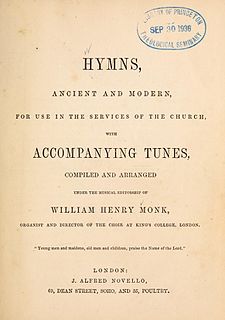
Hymns Ancient and Modern is a hymnal in common use within the Church of England, a result of the efforts of the Oxford Movement. Over the years it has grown into a large family of hymnals. As such, the Hymns Ancient and Modern set the standard for the current hymnal in the Church of England.

"O Sacred Head, Now Wounded" is a Christian Passion hymn based on a Latin text written during the Middle Ages. Paul Gerhardt wrote a German version which is known by its incipit, "O Haupt voll Blut und Wunden".
"For the Beauty of the Earth" is a Christian hymn by Folliott S. Pierpoint (1835-1917).
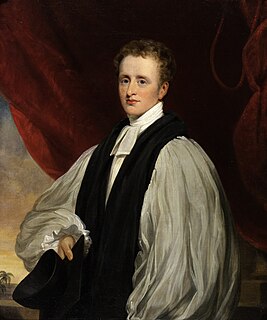
"Holy, Holy, Holy! Lord God Almighty!" is a Christian hymn written by the Anglican bishop Reginald Heber (1783–1826).
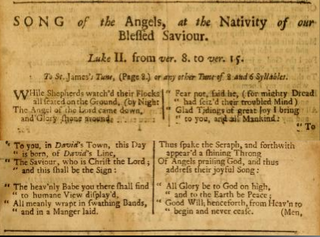
"While shepherds watched their flocks" is a Christmas carol describing the Annunciation to the Shepherds, with words attributed to Irish hymnist, lyricist and England's Poet Laureate Nahum Tate.
"God, the Omnipotent!" is a hymn with words written in 1842 by Henry F. Chorley (1808–1872) and 3rd and 4th stanzas by John Ellerton (1826–1893) in 1870. It is based on a text from Revelation 19:6, "The Lord God omnipotent reigneth" (KJV). Set in 11.10.11.9 meter, the tune is from the 19th century Russian national anthem, God Save The Tsar!, composed by Alexei Lvov (1798–1870) in 1833.

"Soldiers of Christ, Arise" is an 18th-century English hymn. The words were written by Charles Wesley (1707–1788), and the first line refers to the armour of God in Ephesians 6:10–18.
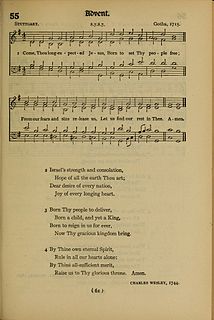
"Come, Thou Long Expected Jesus" is a 1744 Advent and Christmas carol common in Protestant hymnals. The text was written by Charles Wesley. It is performed to one of several tunes, including "Stuttgart" and "Hyfrydol". It is hymn number 66 in the Episcopal Church hymnal ; hymn number 196 in the United Methodist Hymnal ; hymns 1 and 2 in the 1990 Presbyterian Hymnal; and hymn 254 in Evangelical Lutheran Worship, among others. The hymn is considered an enduring classic in Christian hymnology.
Edward Wilton Eddis was a poet and prophet in the Catholic Apostolic Church at Westminster, London and co-author of the Hymns for the Use of the Churches, the hymnal of the Catholic Apostolic Church.

"O'er the Gloomy Hills of Darkness", also titled "O'er Those Gloomy Hills of Darkness", is a Welsh Christian hymn by William Williams Pantycelyn written in 1772. The hymn was written as a missionary hymn; there are conflicting accounts of why the hymn was written. The hymn was later published in 374 hymnals worldwide, though it was censored and altered in the United States by slaveholders for evangelising to slaves. The hymn later fell out of favour with hymn book editors in the 1960s.
Phoebe Hinsdale Brown was the first notable American woman hymnwriter, and the first American woman to write a hymn of wide popularity, "I love to steal awhile away".
Thy hand, O God, has guided is a Christian hymn with words by Edward Plumptre and music by Basil Harwood.
